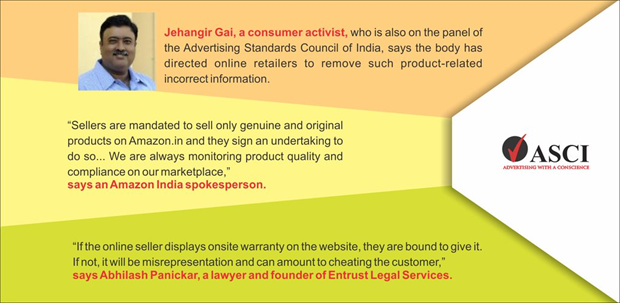ASCI Says Manufacturers Cannot Deny Warranty for Online Purchases; Also, Cracks Whip on Amazon, Ebay, Bloomberg Ads
In a major relief to online buyers, ASCI (Advertising Standards Council of India) has specifically stated that manufacturers cannot deny after sale service for their products which are sold online.
In a Tweet shared on October 26th, ASCI has quoted Jehangir Gai, who is a consumer rights activist, wherein he has said that denial of warranty or guarantee on online purchases is a gross violation of consumer rights. ASCI also shared that all such manufacturers who are denying after sales service for online purchases have been informed to correct their policies.

Thus, any online consumer can now approach Consumer Court or opt for legal remedy in case their goods are denied service by such manufacturers. However, the customer needs to ensure that the product is genuine, with an original bill which reflects payment of relevant taxes; along with a warranty card which is stamped.
Jehangir has said that the terms and conditions as mentioned in the warranty card will hold true in the court; albeit the product should have proper labeling, packaging details along with the MRP of the product. In case the product is imported, then details of the importer are also necessary.
ASCI is supporting the view that if the product is genuine, with the warranty card and other details as mentioned above, then it really doesn’t matter whether the product is being purchased from an online retailer or an authorized dealer of the company.
We have shared in the past, how some manufacturers are deliberately denying after after-sale service and warranty obligations to online purchases. In fact, over 54% of all online goods are now denied a warranty by the manufacturer, which is an alarming trend.
Last year, Lenovo & Toshiba & Gionee shocked everyone when they declared that no warranty would be provided to online goods; This year, LG and Videocon also stopped offering any service to online purchased goods.
Even Dell, whose business model is based on ecommerce warned their users not to buy from Snapdeal, and threatened to stop all after sale services for online purchases!
Flipkart has even dragged Nikon to court over the same issue.
Hopefully, this confirmation from ASCI regarding warranty fulfillment of online purchases will empower customers to handle such denials, which we believe are totally insane and uncalled for. In case you are being denied warranty, then do contact ASCI or Consumer Rights activists for assistance. Legal room is now open for such cases.
Amazon, Ebay, Bloomberg Ads Are Misleading
ASCI has upheld complaint against 74 advertisements which were broadcasted or shown in the month of July. ASCI had received total of 110 complaints.
Some major brands which were rapped for creating misleading advertisements are:
- Amazon’s Kindle ad: It didn’t mention the actual price of the advertised product, and failed to showcase the disclaimer.
- Bloomberg TV’s Ad: It mentioned the words “First. Fastest”, which were not proven or any evidence provided. Further, the ad violated Broadcast Audience Research Council of India (BARC) guidelines regarding advertisement for stock market analysis and research.
- Ebay: In one of their advertisements, Ebay used these terms: “EBay Guarantee – Don’t Worry, Buy Happy”, “EBay guarantee” and “100% Satisfaction or refund/replacement”; which are without any proof or evidence.
Here is the full list of all the advertisements for the month of July, which were termed as misleading by ASCI.
In case you feel that any advertisement or promotion is misleading, then you can file a complaint with ASCI, and help to promote ethically and morally right advertisements.

Hi,
It is not clear that ASCI is saying this. A consumer advocate is saying it and I would expect nothing less from a consumer advocate.
Even if ASCI is saying this, it probably does not have the legal jurisdiction to specify whether a manufacturer can deny warranty to products sold via unauthorized channels. Lastly, while the easier conclusion is to say that the offline retailers are the main cause, it could have been more illuminating if you quoted some company representatives about the reasons for this apparently consumer alienating stance.
Thanks.
Regards,
Bharath.